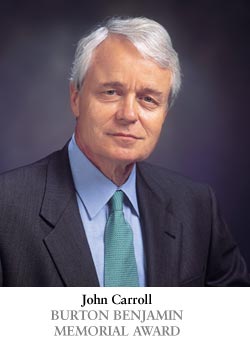John Carroll
Burton Benjamin Memorial Award
 John Carroll is the editor and executive vice president of the Los Angeles Times. Throughout his four decades of newspaper work, Carroll has been a respected leader, admired throughout the industry for his considerable journalistic talents, as well as for his integrity and deep commitment to press freedom and fairness. Carroll was a Nieman Fellow at Harvard University, served on the Pulitzer Prize board from 1994 to 2003, and was chairman of the Pulitzer Prize board in 2002. John Carroll is the editor and executive vice president of the Los Angeles Times. Throughout his four decades of newspaper work, Carroll has been a respected leader, admired throughout the industry for his considerable journalistic talents, as well as for his integrity and deep commitment to press freedom and fairness. Carroll was a Nieman Fellow at Harvard University, served on the Pulitzer Prize board from 1994 to 2003, and was chairman of the Pulitzer Prize board in 2002.
The Tribune Company recruited Carroll in April 2000 to take over a distinguished but demoralized newsroom in Los Angeles. At the Times, hard hit by public criticism of an advertising arrangement, Carroll moved steadily to restore the newsroom’s self-confidence. Carroll placed a high priority on investigative journalism and scrupulous editing. He also revamped the newsroom management and the paper’s design to include more prominent exposure for international coverage. He has served as the newspaper’s chief advocate–defending its Middle East coverage, for example, when readers organized a boycott–as well as its chief critic, reproving his publication for liberal bias in its coverage of an abortion story this spring. In 2004, five journalists at the Los Angeles Times won Pulitzer Prizes, prominently affirming the Times‘ place as a top U.S. newspaper. Carroll began his reporting career at Rhode Island’s Providence Journal-Bulletin before moving to The Baltimore Sun, where his beats included Vietnam, the Middle East, and the White House. In 1972, he joined The Philadelphia Inquirer as an editor. During the next 30 years, his name became synonymous with vibrant, investigative journalism and leadership that enlivened Kentucky’s Lexington Herald-Leader, The Baltimore Sun, and the Los Angeles Times, as well as the communities they serve. |
|
Remarks by John Carroll, Burton Benjamin Memorial Award winner Thank you, Sandy. I’m glad to see so many old friends tonight. And I am proud to receive this award, coming as it does from a group of people who will go anywhere on Earth, literally, to stand beside a journalist in trouble. Each autumn we gather here in New York for an event that is social, elegant, and, in its own way, tribal. It is tribal in the sense that we listen, like primitive people around a campfire, to stories that give us inspiration. The names of the protagonists may strike us as foreign, but the deeds are familiar, evoking something deep in our American memories. Change the names, and these are the stories of John Peter Zenger, Elijah Parish Lovejoy, Ida B. Wells and other Americans who faced prison, mobs, and even death to demonstrate, by brave example, four crucial values of our craft. A journalist, they taught us, must not be afraid to stand alone. A journalist’s work is a counter-weight to the misuse of power. A journalist lives or dies by that humblest form of knowledge, the simple fact. And a journalist, when things get tough, can serve only one master: the public. Now as this award suggests, I’ve been in the newspaper business for a long time. One sees changes. Some of the changes are obvious – the disappearance of the typewriter, for example. Others are more subtle, transforming our work – and the way we think about our work and about ourselves – just a little bit each year. Each year, the organizations we serve grow larger and more complex. Each year, the voice of the journalist grows smaller and smaller within those organizations. And each year, I’m afraid, the gap between ourselves and our heroes grows just a little bit wider. Today, the American public is bombarded with news from many sources, some trustworthy, some not. Few citizens have time to sort it all out. That role falls to us – we who work for corporations and are sometimes derided as the “establishment media.” Are we worthy? Let’s measure ourselves against the four values we celebrate tonight. But, there are limits to our zeal. For decades, our industry has been waging a lavishly financed argument that the public will do just fine with fewer and fewer sources of news. This is a story we cover only tepidly. It appears on the business pages, usually a routine item involving corporate winners, corporate losers and lots of lawyers. But we know it’s more than that. This issue, we know, touches the core of the relationship between journalism and the self-governing people of our nation. It’s time we covered it that way. We – the people in this room – are stewards of a tradition. It is a good tradition, a hard-won tradition. Times may change, but the best of our values must be carried on. The first step in doing so is to see clearly, without self-delusion, who we are today – and to remember, with equal clarity, who we ought to be. Thank you so much. |